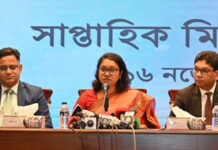
Today, August 1, is the 49th anniversary of the Concert for Bangladesh. The concert was organised by former The Beatles member George Harrison, along with Pandit Ravi Shankar, and was held at the Madison Square Garden in New York City. The concert changed the dynamics among popular music, politics and humanitarian aid forever. The event was a reflection of New-Left political leanings. The main purpose of the concert was to seek aid for the Bengalis fighting for the liberation of Bangladesh. However, the event was also able to raise consciousness among the counterculture movement and world politics.
The Beatles were heartthrobs during that time. Additionally, George Harrison was able to convene famous musicians and singers for the noble event and it attracted hundreds of thousands of music-lovers around the globe. That’s why George Harrison could capitalise on his popularity to depict the true picture of the struggles of Bengalis and the atrocities of Pakistanis by organising the concert. He also wrote and sang his “Bangladesh” song for the first time at this concert. He painted the whole scenario in the song and the first two stanzas read:
My friend came to me, with sadness in his eyes
He told me that he wanted help
Before his country dies
Now I’m asking all of you
To help us save some lives.
George Harrison was accompanied by another former Beatle Ringo Starr in this concert. Other participants included Bob Dylan, Eric Clapton, Leon Russell, Billy Preston, Ustad Ali Akbar Khan, Ustad Alla Rakha Khan, and many more world-famous musicians and singers. It was the first concert of such a huge scale organised for benefitting a humanitarian cause, and was supplemented by a live-performance record album and a feature-length film. Overall, the concert, album, and feature-film raised millions of dollars to support the struggle for freedom of Bengalis and the creation of a separate independent country — Bangladesh.
However, I think the main achievement of this concert was organising it in a county like the United States, where the administration of that time had chosen to oppose the liberation of Bangladesh. The organisation of the concert helped to build public opinion among music-lovers in the United States and all over the world by informing about the real situation in Bangladesh and the suffering of Bengalis. By all means, the Concert for Bangladesh showed a new road map about the role of popular music in political communication to the politicians, activists of social movements, and scholars around the world.
It might be because of the influence of the concert, I met many Americans who listened to the record of the concert or at least the “Bangladesh” song. Many of my senior American friends recalled George Harrison’s “Bangladesh” song whenever they heard that I was from Bangladesh. They acknowledged that they came to know about Bangladesh and the liberation war of Bengalis from this concert.
Pandit Ravi Shankar and George Harrison were undoubtedly champions of our cause and wholeheartedly supported the demand for independent Bangladesh. By all means, the concert had categorically highlighted the catalyst role of music and cultural activities in politics.
Taking the sufferings of Bengalis as an example, the concert worked as a call to action for global political and humanitarian action in support of social justice. It set an example of using popular music for progressive activism in the world. Today, we remember all of the musicians and singers including George Harrison and Pandit Ravi Shankar who organised the “The Concert for Bangladesh” to set a milestone in the history of music and politics.
The writer is an Assistant Professor of Digital Journalism at the University of South Alabama in the United States.









